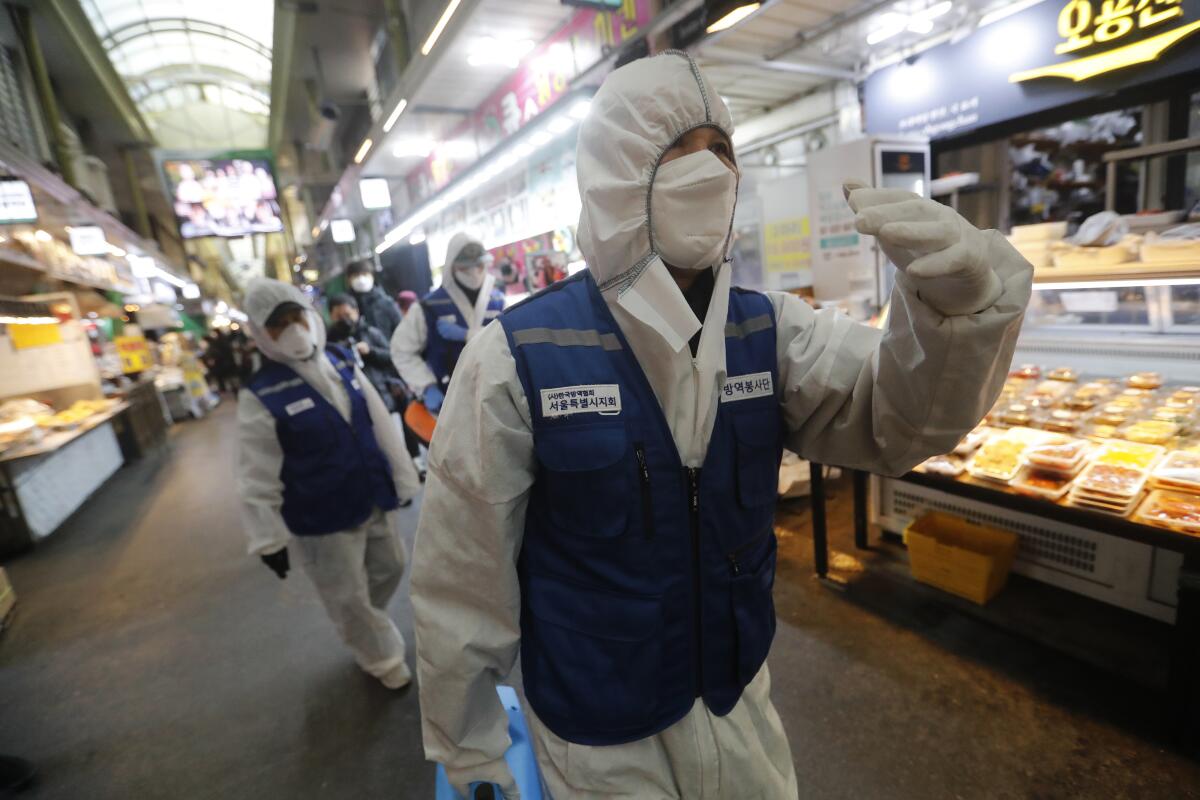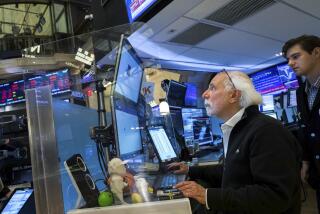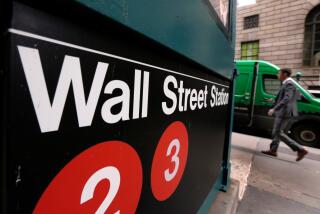Stocks tumble as coronavirus spreads, sparking worry of global economic slowdown

- Share via
The Dow Jones industrials plunged more than 1,000 points in a stock market rout Monday, its worst day in two years, amid concerns that the spreading coronavirus is seriously disrupting the global economy.
The drop of 1,031.61 points in the Dow, to 27,960.80, was the third-largest point decline on record. It was a sharp turnaround from the market’s climb to all-time highs earlier this month. On a percentage basis the 3.56% pullback was nowhere near the worst ever.
The sell-off was across the board. The Standard & Poor’s 500 index fell 3.35%, and the tech-laden Nasdaq composite index skidded 3.71%. Hard-hit sectors included airlines and other travel-related companies, technology, energy and financial shares.
South Korea reported another large jump in new virus cases a day after the president called for “unprecedented, powerful” steps to combat the outbreak.
Norwegian Cruise Lines, Carnival Corp. and Royal Caribbean Cruises all plunged 8% or more, as did American Airlines Group Inc. Apple Inc., American Express Co. and Visa Inc. all fell 4% or more.
Stocks that are popular with small investors also got hit hard. Tesla Inc., for instance, dropped 7.5% after more than doubling since the start of the year, and Plug Power Inc. tumbled 6.6%.
As investors dumped stocks, they fled to assets considered relatively safer, such as gold and U.S. government bonds. Gold jumped 1.7% to 1,672.40 per troy ounce, and higher prices for the benchmark 10-year Treasury note sent the bond’s yield to a near-record low of 1.37%.
“In times of uncertainty, large institutional investors tend to sell first and ask questions later,” said Greg McBride, chief financial analyst with Bankrate.com.
The slide followed steep declines in Europe and Asia as well, with major indices in Germany, France and Japan tumbling 3.5% to 5%.
The U.S. stock market had fared relatively well and set new highs this month despite the spread of the coronavirus from its initial outbreak in China. But amid reports over the weekend that the virus had worsened in countries such as South Korea, Italy and Iran, concerns grew that the worldwide economy and companies’ profits could be further eroded by the contagion. More than 79,000 people worldwide have been infected by the virus.
Several major U.S. companies — including Apple, MGA Entertainment Inc., Under Armour Inc., Starbucks Corp. and Mattel Inc. — that have ties with China already have said the virus is negatively affecting their sales. The virus has disrupted factory production in China and consumer demand there for U.S. goods and services along with travel.
Oil prices also tumbled Monday as traders feared an economic slowdown could slow demand for crude. The price of the benchmark West Texas intermediate crude fell $1.95, or 3.7%, $51.43 a barrel on U.S. markets.
Many investors and analysts had already considered the stock bull market — now in its 11th year — long in the tooth and ripe for a pullback, which the virus provided.
“The coronavirus is a genuine concern, so instead of a couple of percentage points we got a three-plus percentage decline” in the stock market, said John Bollinger, head of Bollinger Capital Management in Redondo Beach.
But Bollinger noted that pullbacks of 3% to 4% have routinely occurred during the long rally and that this drop also could be temporary. “This might be a one-day wonder,” Bollinger said. “I suspect we’ll see some more pain here, but I think we’re in a correction, not a bear market.”
Wall Street technically defines a correction as a 10% drop from its most recent highs. The Dow Jones industrials hit a record-high 29,551.42 on Feb. 12, so the blue-chip average now is down 5.4% from that level.
Monday’s drop was the worst point decline for the Dow since it fell 1,032.89 points on Feb. 8, 2018. The worst point decline was three days earlier, when the average dropped 1,175.21. Both sell-offs were in response to fears of higher interest rates.
The deadly coronavirus outbreak is hurting scores of companies in California and nationwide that depend on Chinese production and consumer spending.
Some analysts said the latest pullback shouldn’t scare long-term investors.
“Stay the course, and if you’ve been waiting for a better buying opportunity, the stock market is 3% cheaper than it was Friday,” McBride said.
Jason Ware, chief investment officer of Albion Financial Group, said that “certainly the coronavirus is going to slow economic growth” but that given the market’s recent highs, “if it wasn’t the coronavirus eventually we would have a pullback or correction at some point based on some other market event.”
“We fall into that behavioral trap where we say, ‘OK, it’s down 3% but it could go down 5% or 10% and I need to wait until the dust settles,” Ware said. “But of course, by the time the dust settles you’ve missed the bounce back up. That’s what makes timing and jumping in and out of the market so difficult.”
Within an hour after the market’s close, President Trump — who routinely touts the market’s gains and was no doubt aware of its drop Monday while he’s visiting India — tweeted that the coronavirus “is very much under control in the USA” and added, “Stock Market starting to look very good to me!”
Before Monday’s drop, the ratio of the S&P 500’s price to its components’ average anticipated earnings for the next 12 months was averaging about 19, well above its historical average of about 15.5 and a signal that prices were getting rich. The ratio has now slipped back to 18.8, according to FactSet.
By comparison, the S&P’s price-earnings ratio after its plunge in February 2018 was 16.5. The index surged 29% in the next two years.
Analysts said some of the underlying trends supporting stocks remained unchanged, including low interest rates and mild inflation. They also said the coronavirus will probably prompt central banks in the United States and abroad to maintain monetary policies that, for now, would not cause a notable jump in interest rates.
That said, “for traders and short-term types,” the spreading virus “is a major event” as evidenced by the steep drops in certain stocks, Bollinger said. “It’s a short-term threat to the earnings of these companies.”
The Associated Press contributed to this report.
More to Read
Inside the business of entertainment
The Wide Shot brings you news, analysis and insights on everything from streaming wars to production — and what it all means for the future.
You may occasionally receive promotional content from the Los Angeles Times.













